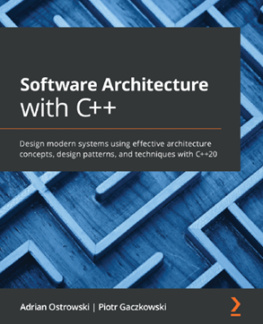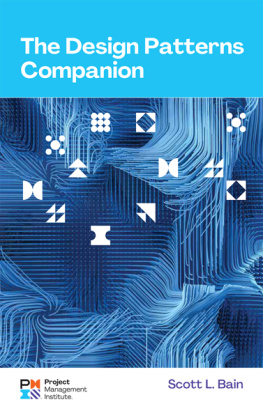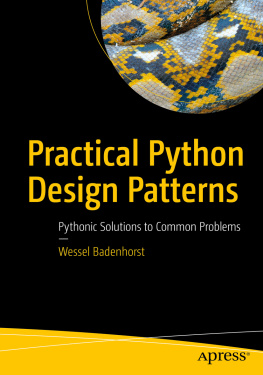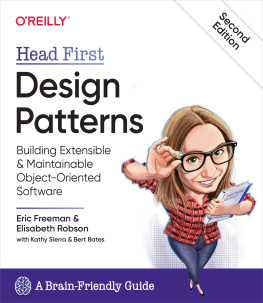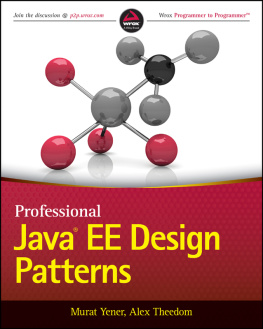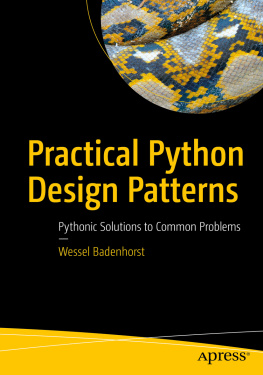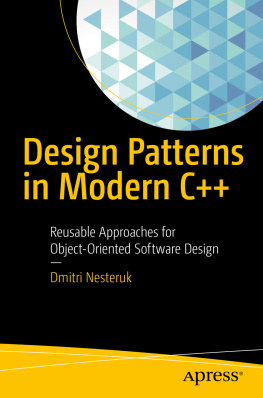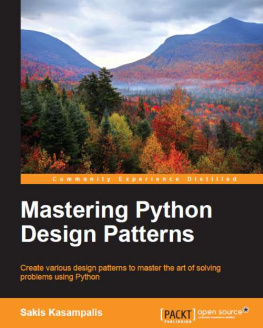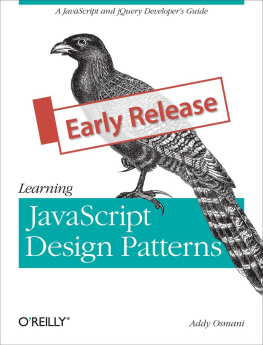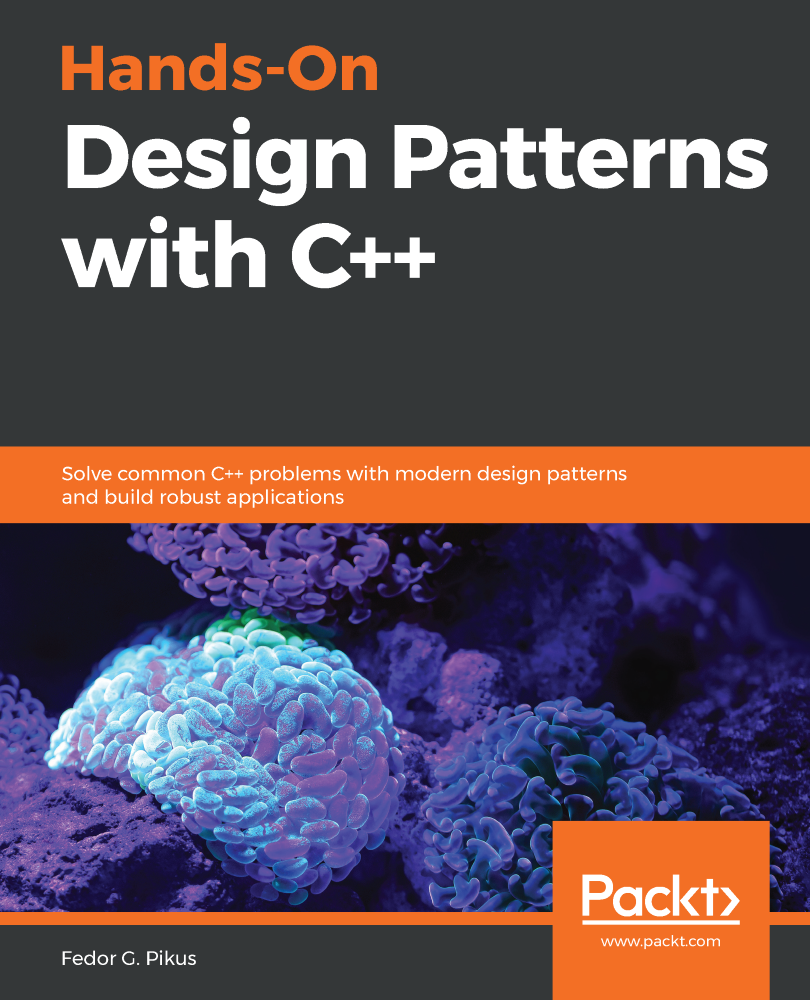
Hands-On Design Patterns
with C++
Solve common C++ problems with modern design patterns and build robust applications
Fedor G. Pikus

BIRMINGHAM - MUMBAI
Hands-On Design Patterns with C++
Copyright 2019 Packt Publishing
All rights reserved. No part of this book may be reproduced, stored in a retrieval system, or transmitted in any form or by any means, without the prior written permission of the publisher, except in the case of brief quotations embedded in critical articles or reviews.
Every effort has been made in the preparation of this book to ensure the accuracy of the information presented. However, the information contained in this book is sold without warranty, either express or implied. Neither the author, nor Packt Publishing or its dealers and distributors, will be held liable for any damages caused or alleged to have been caused directly or indirectly by this book.
Packt Publishing has endeavored to provide trademark information about all of the companies and products mentioned in this book by the appropriate use of capitals. However, Packt Publishing cannot guarantee the accuracy of this information.
Commissioning Editor: Richa Tripathi
Acquisition Editor: Shriram Shekhar
Content Development Editor: Manjusha Mantri
Technical Editor: Royce John
Copy Editor: Safis Editing
Project Coordinator: Prajakta Naik
Proofreader: Safis Editing
Indexer: Tejal Daruwale Soni
Graphics: Jisha Chirayil
Production Coordinator: Aparna Bhagat
First published: January 2019
Production reference: 1280119
Published by Packt Publishing Ltd.
Livery Place
35 Livery Street
Birmingham
B3 2PB, UK.
ISBN 978-1-78883-256-4
www.packtpub.com
mapt.io
Mapt is an online digital library that gives you full access to over 5,000 books and videos, as well as industry leading tools to help you plan your personal development and advance your career. For more information, please visit our website.
Why subscribe?
Spend less time learning and more time coding with practical eBooks and videos from over 4,000 industry professionals
Improve your learning with skill plans designed especially for you
Get a free eBook or video every month
Mapt is fully searchable
Copy and paste, print, and bookmark content
Packt.com
Did you know that Packt offers eBook versions of every book published, with PDF and ePub files available? You can upgrade to the eBook version at www.packt.com and, as a print book customer, you are entitled to a discount on the eBook copy. Get in touch with us at customercare@packtpub.com for more details.
At www.packt.com , you can also read a collection of free technical articles, sign up for a range of free newsletters, and receive exclusive discounts and offers on Packt books and eBooks.
Contributors
About the author
Fedor G. Pikus is a chief engineering scientist in the Design-to-Silicon division of Mentor Graphics (a Siemens business), and is responsible for the long-term technical direction of Calibre products, the design and architecture of software, and research into new software technologies. His earlier positions include senior software engineer at Google and chief software architect at Mentor Graphics. Fedor is a recognized expert on high-performance computing and C++. He has presented his works at CPPCon, SD West, DesignCon, and in software development journals, and is also an O'Reilly author. Fedor has over 25 patents, and over 100 papers and conference presentations on physics, EDA, software design, and C++.
This book would not be possible without the support of my wife, Galina, who made me go on in the moments of self-doubt. Thank you to my sons, Aaron and Benjamin, for their enthusiasm, and to my cat, Pooh, for letting me use his warming pad as my laptop.
About the reviewer
Cale Dunlap has been writing code in various languages since high school, when he wrote his first video game mod for Half-Life in 1999. In 2002, he contributed to the semi-popular Firearms mod for Half-Life and eventually helped bring that same video game mod to the Source Engine as FirearmsSource. He's earned an associate's degree in computer information systems and a bachelor's degree in game and simulation programming. He's worked professionally as a software developer for small companies since 2005, contributing to software ranging from web applications to military simulations. He currently works as a senior interactive developer for a creative agency based in Orange County, California, called Column Five.
Thank you to my fianc Elizabeth, our son, Mason, and the rest of our family, for supporting me through my first book review.
Packt is searching for authors like you
If you're interested in becoming an author for Packt, please visit authors.packtpub.com and apply today. We have worked with thousands of developers and tech professionals, just like you, to help them share their insight with the global tech community. You can make a general application, apply for a specific hot topic that we are recruiting an author for, or submit your own idea.
Preface
Another book on design patterns in C++? Why that, and why now? Hasn't everything there is to know about design patterns been written already?
There are several reasons why yet another book on design patterns has been written, but first of all, this is very much a C++ bookthis is not a book on design patterns in C++ but a book on design patterns in C++, and the emphasis sets it apart. C++ has all the capabilities of a traditional object-oriented language, so all the classic object-oriented design patterns, such as Factory and Strategy, can be implemented in C++. A few of those are covered in this book. But the full power of C++ is realized when you utilize its generic programming capabilities. Remember that design patterns are frequently occurring design challenges and the commonly accepted solutionboth sides are equally important in a pattern. It stands to reason that when new tools become available, new solutions become possible. Over time, the community settles on some of these solutions as the most advantageous overall, and a new variation of an old design pattern is bornthe same challenge, but a different preferred solution. But expanding capabilities also open up new frontierswith new tools at our disposal, new design challenges arise.
In this book, we focus on design patterns where C++ has something essential to add to at least one of the two sides of the pattern. On the one hand, we have patterns such as Visitor, where the generic programming capabilities of C++ allow for a better solution. That better solution was made possible by new features added in recent versions of the language, from C++11 to C++17. On the other hand, generic programming is still programming (only the execution of the program happens at compile time); programming requires design, and design has common challenges that are not all that dissimilar to the challenges of traditional programming. Thus, many of the traditional patterns have their twins, or at least close siblings, in generic programming, and we largely focus on those patterns in this book. A prime example is the Strategy pattern, better known in the generic programming community by its alternative name, the Policy pattern. Finally, a language as complex as C++ is bound to have a few idiosyncrasies of its own that often lead to C++, specific challenges that have common, or
Next page

